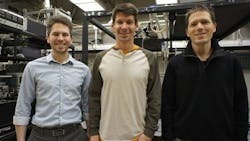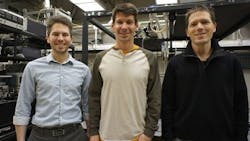New lenses improve two-photon microscopy to image larger area of neuronal activity
Researchers from the University of North Carolina – Chapel Hill (UNC-Chapel Hill) and North Carolina State University (NC State; Raleigh, NC) built on an existing technology—two-photon microscopy—to allow neuroscientists to capture images of the brain almost 10 times larger than previously possible, therefore helping them to better understand the behavior of neurons in the brain.
Related: Light-sheet microscopy method shows how stem cells exit the bloodstream
A UNC-Chapel Hill research team made up of Jeff Stirman, Ikuko Smith, and Spencer Smith wanted to be able to look at "ensemble" neuronal activity related to how mice process visual input—that is, they wanted to look at activity in neurons across multiple areas at the same time. To do so, they used a two-photon microscope, which images fluorescence. In this case, it could be used to see which neurons "light up" when active.
The problem was that conventional two-photon microscopy systems could only look at approximately 1 mm2 of brain tissue at a time, which made it hard to simultaneously capture neuron activity in different areas. So the researchers worked with Michael Kudenov, an assistant professor of electrical and computer engineering at NC State whose work focuses on developing new instruments and sensors to improve the performance of technologies used in bioimaging, among other areas.
Kudenov designed a series of new lenses for the two-photon microscope. Then, Stirman further refined the designs and incorporated them into an overall two-photon imaging system that allowed the research team to scan much larger areas of the brain. Instead of capturing images covering 1 mm2 of the brain, they could capture images covering more than 9.5 mm2. This advance allows them to simultaneously scan widely separated populations of neurons.
Full details of the work appear in the journal Nature Biotechnology; for more information, please visit http://dx.doi.org/10.1038/nbt.3594.

